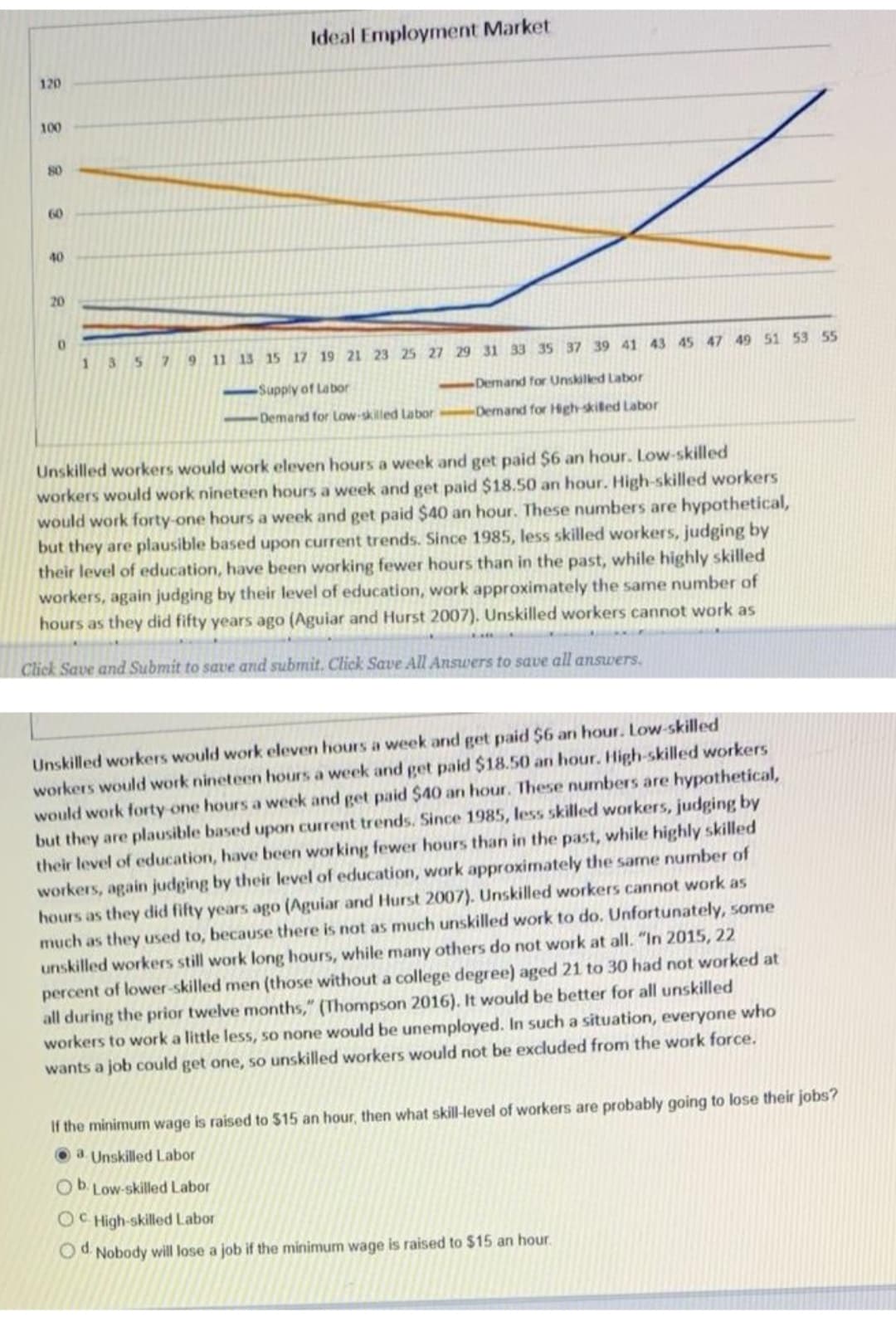If the minimum wage is raised to $15 an hour, then what skill-level of workers are probably going to lose their jobs? O a. Unskilled Labor Ob. Low-skilled Labor OC High-skilled Labor d. Nobody will lose a job if the minimum wage is raised to $15 an hour.
If the minimum wage is raised to $15 an hour, then what skill-level of workers are probably going to lose their jobs? O a. Unskilled Labor Ob. Low-skilled Labor OC High-skilled Labor d. Nobody will lose a job if the minimum wage is raised to $15 an hour.
Principles of Microeconomics
7th Edition
ISBN:9781305156050
Author:N. Gregory Mankiw
Publisher:N. Gregory Mankiw
Chapter19: Earnings And Discrimination
Section: Chapter Questions
Problem 9PA
Related questions
Question

Transcribed Image Text:Ideal Employment Market
120
100
80
60
40
20
1357 9 11 13 15 17 19 21 23 25 27 29 31 33 35 37 39 41 43 45 47 49 51 53 55
Supply of Labor
Demand for Unskiled Labor
Demand for Low-skilled Labor Demand for High-skiled Labor
Unskilled workers would work eleven hours a week and get paid $6 an hour. Low-skilled
workers would work nineteen hours a week and get paid $18.50 an hour. High-skilled workers
would work forty-one hours a week and get paid $40 an hour. These numbers are hypothetical,
but they are plausible based upon current trends. Since 1985, less skilled workers, judging by
their level of education, have been working fewer hours than in the past, while highly skilled
workers, again judging by their level of education, work approximately the same number of
hours as they did fifty years ago (Aguiar and Hurst 2007). Unskilled workers cannot work as
Click Save and Submit to save and submit. Click Save All Answers to save all answers.
Unskilled workers would work eleven hours a week and get paid $6 an hour. Low-skilled
workers would work nineteen hours a week and get paid $18.50 an hour. High-skilled workers
would work forty one hours a week and get paid $40 an hour. These numbers are hypothetical,
but they are plausible based upon current trends. Since 1985, less skilled workers, judging by
their level of education, have been working fewer hours than in the past, while highly skilled
workers, again judging by their level of education, work approximately the same number of
hours as they did fifty years ago (Aguiar and Hurst 2007). Unskilled workers cannot work as
much as they used to, because there is not as much unskilled work to do. Unfortunately, some
unskilled workers still work long hours, while many others do not work at all. "In 2015, 22
percent of lower-skilled men (those without a college degree) aged 21 to 30 had not worked at
all during the prior twelve months," (Thompson 2016). It would be better for all unskilled
workers to work a little less, so none would be unemployed. In such a situation, everyone who
wants a job could get one, so unskilled workers would not be excluded from the work force.
If the minimum wage is raised to $15 an hour, then what skill-level of workers are probably going to lose their jobs?
O a. Unskilled Labor
Ob. Low-skilled Labor
OC High-skilled Labor
Od Nobody will lose a job if the minimum wage is raised to $15 an hour.
Expert Solution
This question has been solved!
Explore an expertly crafted, step-by-step solution for a thorough understanding of key concepts.
This is a popular solution!
Trending now
This is a popular solution!
Step by step
Solved in 2 steps

Knowledge Booster
Learn more about
Need a deep-dive on the concept behind this application? Look no further. Learn more about this topic, economics and related others by exploring similar questions and additional content below.Recommended textbooks for you

Principles of Microeconomics
Economics
ISBN:
9781305156050
Author:
N. Gregory Mankiw
Publisher:
Cengage Learning

Principles of Economics, 7th Edition (MindTap Cou…
Economics
ISBN:
9781285165875
Author:
N. Gregory Mankiw
Publisher:
Cengage Learning


Principles of Microeconomics
Economics
ISBN:
9781305156050
Author:
N. Gregory Mankiw
Publisher:
Cengage Learning

Principles of Economics, 7th Edition (MindTap Cou…
Economics
ISBN:
9781285165875
Author:
N. Gregory Mankiw
Publisher:
Cengage Learning




Microeconomics: Private and Public Choice (MindTa…
Economics
ISBN:
9781305506893
Author:
James D. Gwartney, Richard L. Stroup, Russell S. Sobel, David A. Macpherson
Publisher:
Cengage Learning